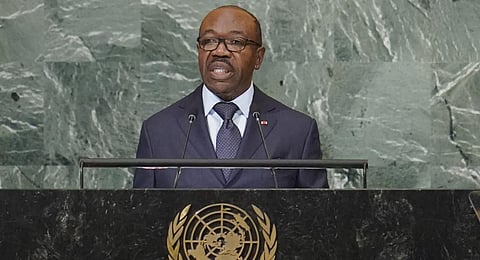

DAKAR: Mutinous soldiers in Gabon said Wednesday they were overturning the results of a presidential election that was to extend the Bongo family's 55-year hold on power.
The central African country's election committee announced that President Ali Bongo Ondimba, 64, had won the election with 64% of the vote early Wednesday morning. Within minutes, gunfire was heard in the center of the capital, Libreville.
A dozen uniformed soldiers appeared on state television later the same morning and announced that they had seized power.
“We reaffirm our commitment to respecting Gabon’s commitments to the national and international community," said a spokesperson for the group, whose members were drawn from the gendarme, the republican guard and other factions of the security forces.
Bongo was seeking a third term in elections this weekend. He served two terms since coming to power in 2009 after the death of his father, Omar Bongo, who ruled the country for 41 years. Another group of mutinous soldiers attempted a coup in January 2019, while Bongo was in Morocco recovering from a stroke, but they were quickly overpowered.
In the election, Bongo faced an opposition coalition led by economics professor and former education minister Albert Ondo Ossa, whose surprise nomination came a week before the vote.
There were concerns about post-election violence, due to deep-seated grievances among the population of some 2.5 million. Nearly 40% of Gabonese ages 15-24 were out of work in 2020, according to the World Bank.
After last week’s vote, the Central African nation’s Communications Minister, Rodrigue Mboumba Bissawou, said on state television that there would be a nightly curfew from 7 p.m. to 6 a.m. He said internet access was being restricted indefinitely as there had been calls for violence and efforts to spread disinformation.
Every vote held in Gabon since the country’s return to a multi-party system in 1990 has ended in violence. Clashes between government forces and protesters following the 2016 election killed four people, according to official figures. The opposition said the death toll was far higher.
Fearing violence, many people in the capital went to visit family in other parts of the country before the election or left Gabon altogether. Others stockpiled food or bolstered security in their homes.